Vietnam: What are the sample descriptive essays on making “Banh Chung” (Chung cake) for Tet under the 6th-grade Language curriculum? What are the rights of 6th-grade students?
What are the sample descriptive essays on making “Banh Chung” (Chung cake) for Tet under the 6th-grade Language curriculum in Vietnam?
Students can refer to the following sample descriptive essays on making “Banh Chung” (Chung cake) for Tet under the 6th-grade Language curriculum in Vietnam:
Sample 1
Every year on the 28th day of the Lunar December, my family usually gathers to make Chung cakes for Tet. Regardless of how busy they are, everyone comes together on this day to enjoy family time. This makes me eagerly anticipate Tet.
On Tet, everyone in the family is busy preparing for the tradition of making Chung cakes. Grandma and mom go to the market to buy ingredients, while grandpa and dad prepare the large family pot. I am assigned to wash dong leaves, a task I've known how to do since I was little, to prepare for the cake-making process. During Tet, working together with everyone makes me feel excited and eager.
Once all the preparations are done, my grandfather starts making the cakes. First, he uses square molds to shape the cake, helping it retain its square form and not become misshapen. Then, he arranges each dong leaf in the mold, adds a layer of sticky rice, pork, and green beans on top. Finally, he ties the cake tightly with soft string. Although the cake-making process is simple, creating a beautiful Chung cake requires patience, carefulness, and a lot of skills. While making cakes together, everyone usually talks and laughs joyfully.
For me, the Tet holiday is special because I get to return to my hometown and spend more time with my family. I will never forget the happiness of reuniting with my loved ones.
Sample 2
Every year, on New Year's Eve, my village organizes the making of Chung cakes to give to those in difficult circumstances in the area. It is one of the most meaningful experiences for me.
Early in the morning, I, along with my mom and aunts, go to the market to buy the necessary ingredients for making Chung cakes. At the village entrance, people are washing dong leaves while chatting animatedly. The young men of the village are assigned to transport baking tools, tables, chairs, etc., to prepare for the cake-making. The atmosphere is bustling and lively. Once everything is ready, the village head talks about the significance of the cake-making event. Everybody has work to do, everyone is busy, yet their faces shine with excitement and enthusiasm.
People gather in the courtyard of the cultural house to make cakes. The dong leaves are washed, dried, and neatly arranged into each cake mold. Everyone takes turns putting ingredients into the mold. Then, skillful hands swiftly wrap and tie the string to secure the square Chung cakes.
After wrapping, the cakes are put into iron pots and cooked over a wood stove. Once cooked, the Chung cake emits a unique fragrant aroma. The sticky rice has a sweet taste, with the rich flavor of pork and the nutty taste of green beans. Once completed, these cakes are given to low-income families and lonely elders in the neighborhood. This way, everyone hopes to bring a warmer and more fulfilling Tet to those less fortunate.
Chung cake is a traditional cake of the Vietnamese people. Sharing Chung cake with loved ones is a special tradition, and enjoying them together can be a real joy. I hope that this tradition will be preserved and promoted, as it is a way for us to step into a new year full of luck together.
Sample 3
Every year, when Tet comes, my parents always arrange their work to take me to the hometown to celebrate Tet with my grandparents. Living in the love of my grandparents and experiencing the moment of gathering to make Chung cake with my family makes me feel how wonderful Tet is.
Today, when many households have given up the habit of making Chung cakes, my family still keeps this tradition. This year, I volunteered to clean the kitchen and lay out a sheet of plastic to keep the cake-making area tidy; then, I took charge of washing the dong leaves that my grandfather picked from the garden to ensure they are clear and clean for the cake. My grandpa chose the largest, greenest, and most beautiful leaves from the garden, and cakes wrapped in these leaves will undoubtedly be beautiful! My mom and grandma bring out the ingredients one by one. Then, each person will sit and wrap their delicious cakes. Everyone puts ingredients into the mold, then quickly wraps and ties the string to secure the square cakes. However, my grandfather, who is a master cake maker in the village, doesn’t need a mold, yet his cakes are still unusually beautiful.
When the family’s green cakes are wrapped and cooked, my grandma is responsible for placing them into iron pots over a wood stove. Once cooked, the Chung cake emanates a special fragrance, with a subtle aroma of sticky rice, the richness of pork, and the nutty flavor of green beans. After the cakes are cooked, my dad and grandfather take them out to drain the water. Finally, my mom and I choose the most beautiful cake to place on the altar as an offering to the ancestors.
Making Chung cake with family is a special and happy experience. Tet becomes more meaningful and warm when sitting with grandma and mom next to the boiling pot of Chung cakes. I hope this tradition will be maintained and developed forever.
Note: The information is for reference only!
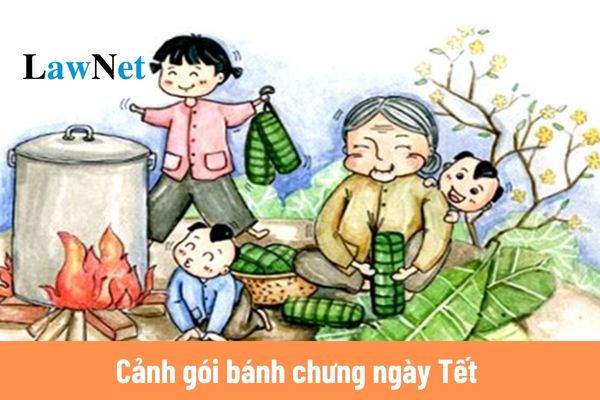
What are the sample descriptive essays on making “Banh Chung” (Chung cake) for Tet under the 6th-grade Language curriculum in Vietnam? (Image from the Internet)
What are the rights of 6th-grade students in Vietnam?
According to the regulations in Article 35 of the lower secondary school, upper secondary school and multi-level school charter issued with Circular 32/2020/TT-BGDDT, the rights of 6th-grade students in Vietnam are as follows:
- Receive a comprehensive education with fairness, be provided with time, facilities, hygiene and safety to learn in class and self-learn at home, be informed of their education and training, and be able to use learning, cultural and sport equipment of their schools as per the law.
- Receive respect, protection and fair and democratic treatment, complain to their schools and education authorities about decisions concerning themselves; transfer school with legitimate reason as per existing regulations; enter school before the compulsory starting age, skip a grade and study at an age higher than the compulsory attendance age according to regulations in Article 33 of Circular 32/2020/TT-BGDDT.
- Participate in activities for development of their gifts in academic subjects, sports and art organized by their schools if able to.
- Students eligible for social benefits, disadvantaged students and gifted students may receive sponsorship or other benefits as per the law.
- Transfer school if eligible according to regulations following school transfer procedures stipulated by the Minister of Education and Training.
- Enjoy other rights as per the law.
What learning outcomes are required for form reading comprehension of literary texts in the 6th-grade Literature curriculum in Vietnam?
According to Section 4 of the Appendix to the General Education Program for in Literature issued together with Circular 32/2018/TT-BGDDT, learning outcomes required for form reading comprehension in the 6th-grade Literature curriculum in Vietnam are as follows:
- Recognize some elements of legend, fairy tale, fable stories such as plot, character, the narrator's words, and the character's words.
- Recognize and analyze character traits expressed through character appearance, gestures, actions, language, and thoughts.
- Recognize the first-person and third-person narrators.
- Identify the number of syllables, lines, rhymes, rhythm of the six-eight poetic form.
- Recognize and initially comment on the unique features of a poem expressed through words, imagery, rhetorical devices.
- Identify and state the effects of narrative and descriptive elements in poetry.
- Recognize the recording form, storytelling method, first-person narrative in memoirs or travelogues.
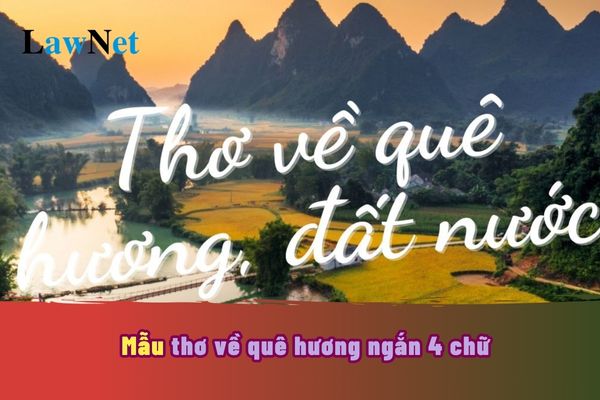


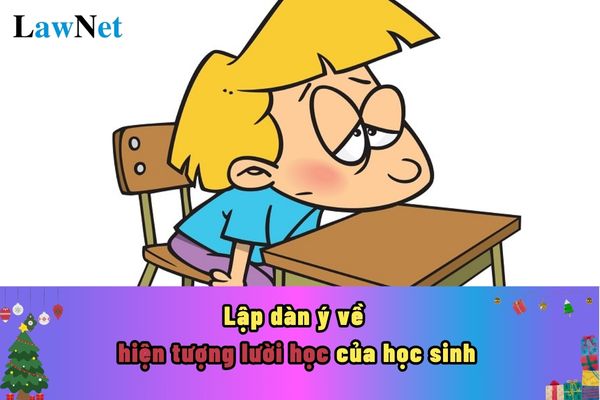
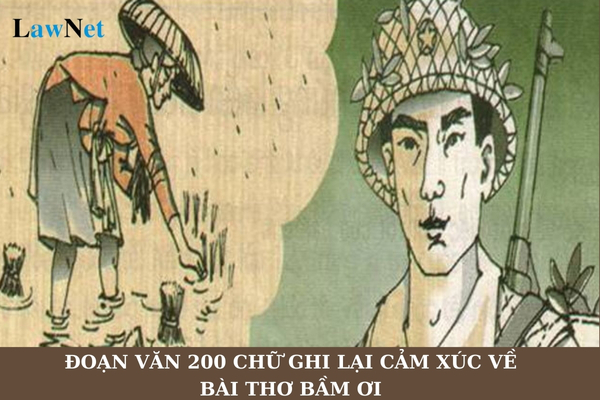
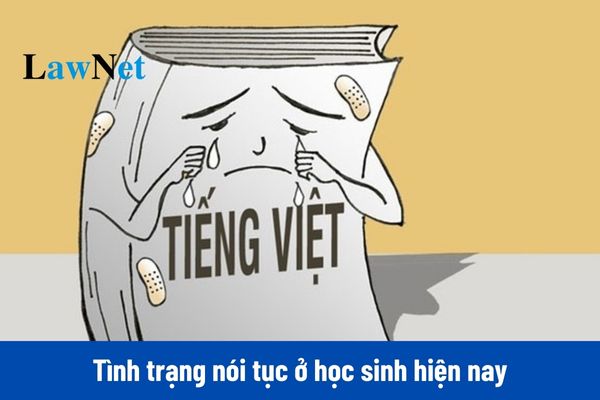
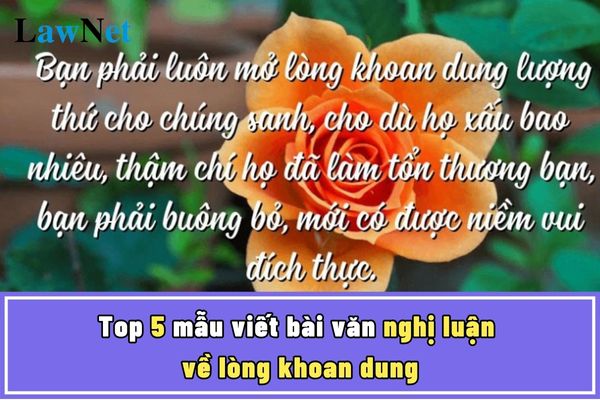
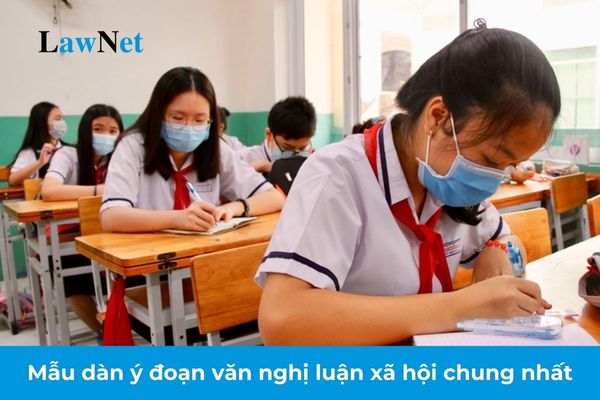
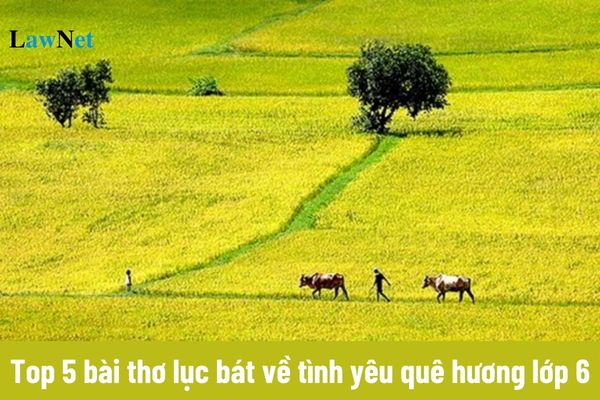
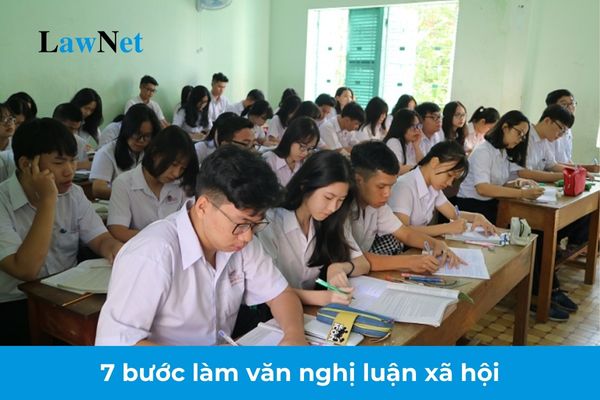
- What are details of the Cultural Heritage Law 2024? What are regulations on educational activities of museums in Vietnam?
- Where is Congo? When do students in Vietnam learn about the geographical location of African?
- How to prevent school violence in vocational education institutions in Vietnam?
- Vietnam: What are the guidelines for making a Christmas tree from cardboard? May students participate in making Christmas Trees from cardboard held by their classes?
- What are guidelines on handling incidents of school violence in Vietnam?
- What is Google Scholar? What contents must be included in the Regulation on the organization of online university training in Vietnam?
- Vietnam: What are the coloring pages themed Tet and Spring for children? What are the 03 available types of preschool education institutions?
- What is social evil? What are objectives for preventing and combating drug-related social evils in schools by 2025 in Vietnam?
- What is the sample outline for an essay showing feelings on the town scene at night in the short story "Hai đứa trẻ"? What are the requirements for the programmes of general education in Vietnam?
- What are the sample social argumentative essays on the waste of idle time among Vietnamese youth? What is the basis for assessing the training results of 11th-grade students?

